Ewedu also known as molokhia or jute leaves is another popular Nigerian soup popularly eaten with Nigerian stew such as buka stew or gbegiri. The soup is commonly served with fufu, garri or amala. Ewedu soup is similar to okra soup because of its viscosity but mainly eaten by the Yoruba tribe of Nigeria.
Learn how to make this yoruba classic soup with this recipe using fresh or frozen jute leaves and how to store it.
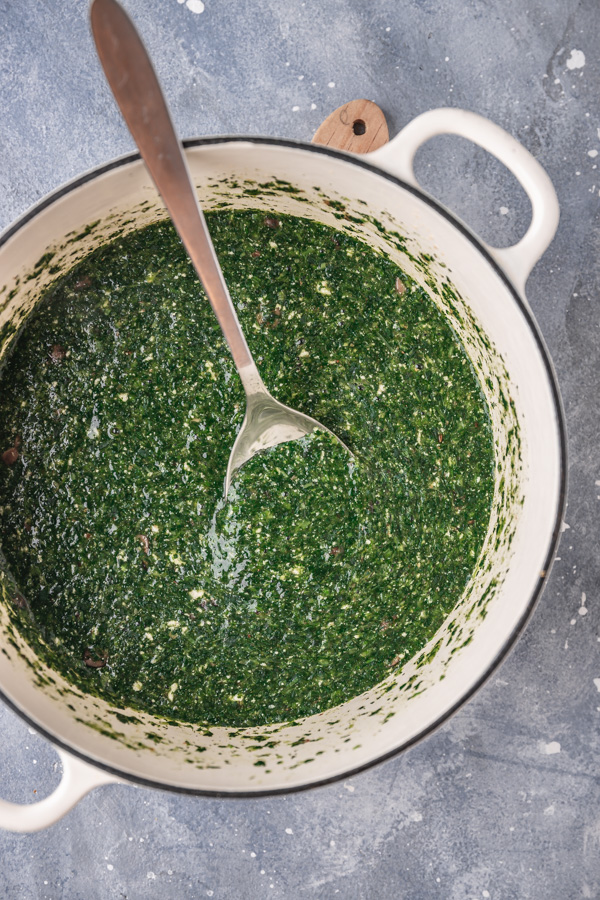
Ewedu recipe
Today I am sharing with you how to cook frozen ewedu as this is what is mostly available to me here in the UK. I have used and cooked the fresh leaves in the past but it is scarce or I would have to wait for a certain number of days for the shop to stock it.
Frozen molokhia is equally good, if not better than the fresh ones we get here. More importantly, readily available and super affordable. It draws well (great viscosity) without the need to add potash also know as kaun in yoruba.
The cooking process for the fresh and frozen vegetable is similar and I will walk you through it. You will be happy to know you do not need ijabe which is the small kitchen cooking-broom used in whisking to break it down. The blender is equal to the task, let’s get down with it.
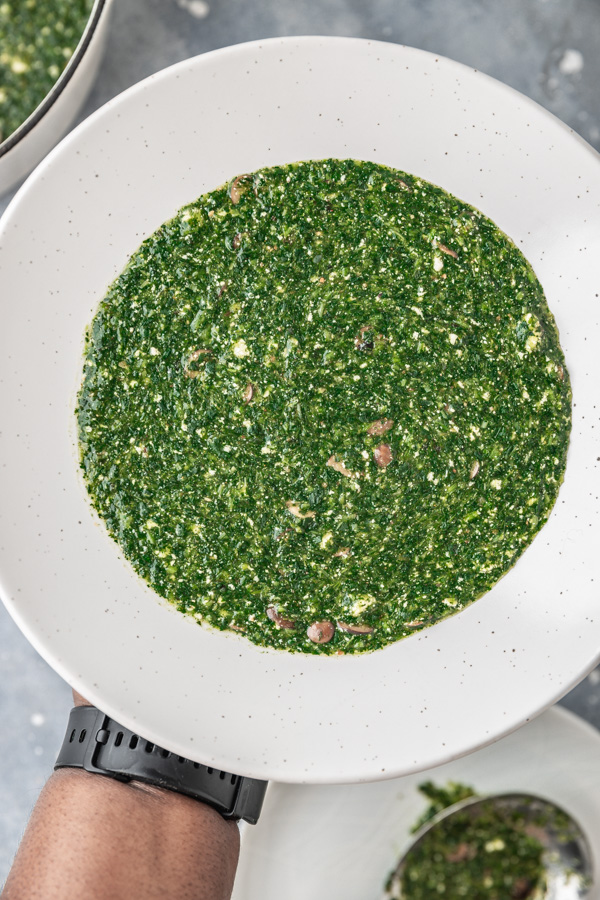
What is ewedu and why you will love it
- Ewedu also known as jute leaves in English, is a type of leafy vegetable (Corchorus olitorius) that is found in the tropic and subtropical region of the world like Africa.
- It is quick and easy to make and requires no expertise.
- It is a savory dish, delicious, and if done right would have some sort of viscosity to it just like okra.
- Jute leaf is highly nutritious with many health benefits.
- Quick overview of this highly nutritious green leaves.
Ingredients
Frozen ewedu: the one I am using is already blended but they sometimes come unblended
Ground crayfish
Egusi (ground melon seed) this is optional
Iru (locust beans) if you are reading this from Nigeria then you may have access to iru Pete which is traditionally added to the soup. For us in diaspora, we mostly have iru woro and it works the same as well.
Salt
Bouillon powder
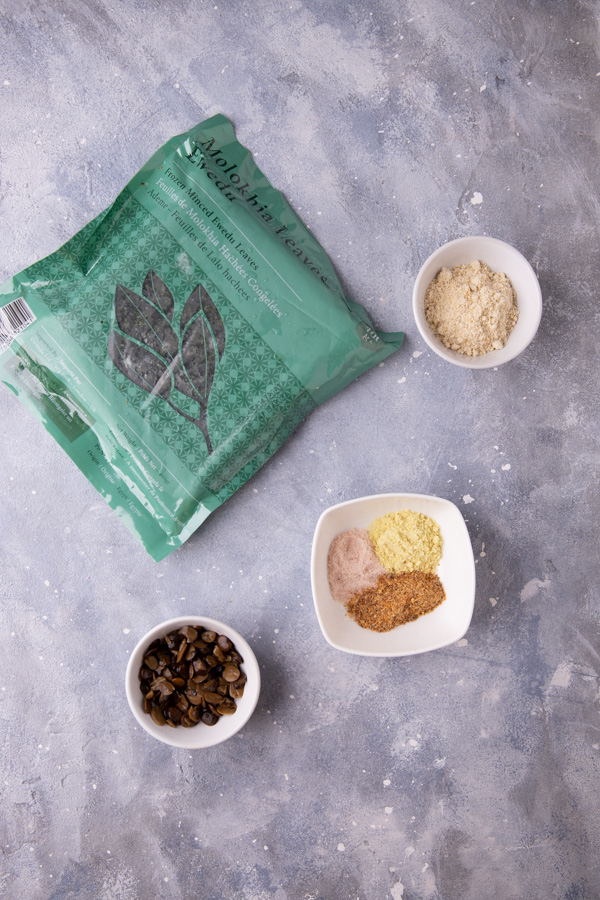
Equipment needed
A medium size saucepan
Hand held whisk or ladle
Small mixing bowl
Prep
- rinse the locust beans, that is if you are using iru woro.
- Mix 1 tablespoon of water to the ground melon to a form a paste. Then set aside
How to cook fresh ewedu soup
Fresh jute leaves: Pluck the jute leaves from the stem if using fresh leaves. Rinse and make sure it is sand-free and transfer to a blender.
Add little water to aid blending and blend until coarse or puree if that is the texture you prefer. Tip: add about 1 cup of water to blend 4 to 5 cups of tightly packed ewedu, too much water would hinder the vegetable from drawing.
Transfer the blended vegetable to a saucepan and place on low medium heat. Add the melon paste in bits, iru, and cook for about 2 minutes.
Stir the soup and break the lumps of melon into the soup with the back of the spoon. Add ground crayfish, salt, and bouillon powder and stir to combine.
Continue to cook for another 3 minutes, taste and adjust seasoning accordingly.
How to cook frozen ewedu soup
Defrost the frozen molokhia: you can use the defrost function of your microwave to achieve this or soak the frozen vegetable while still in the bag in warm water. Another way to defrost frozen jute leaves is by leaving it in the fridge overnight.
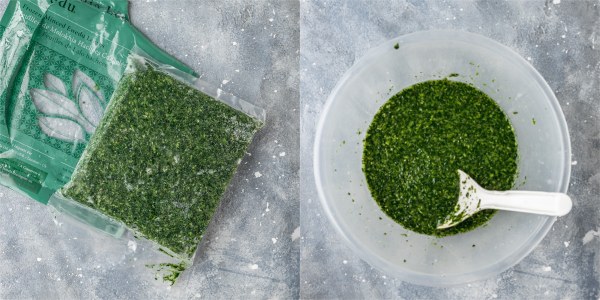
Cook: Place a pan on low-medium heat, add ¾ cup of water and bring to a gentle boil for about a minute (this is assuming you will be cooking 400g of frozen jute leaves) then add the melon paste to the boiling water in bits followed by the washed locust beans.
Do not stir as you want the melon to solidify a bit. cook on medium heat for 2 minutes or so the stir to combine, break the lumps of egusi with the back of the spoon.
Pour the thawed ewedu into the pot and stir to combine. Add ground crayfish, salt, and bouillon powder, stir and bring to a gentle boil for another 3 minutes. Taste and adjust the seasoning to suit your preference.
Take if off the heat immediately and serve with your Nigerian soup of choice.
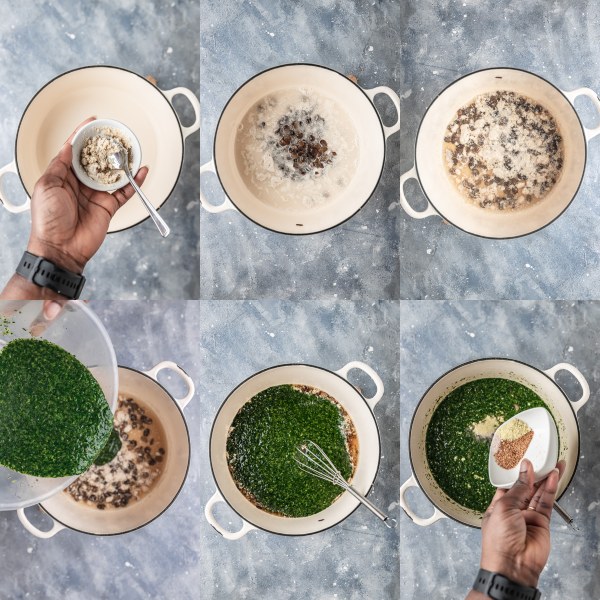
How to serve
Ewedu is traditionally served with soups such as beef stew, chicken stew, fish stew, or buka stew and then accompanied with a swallow of choice. The popular swallow you can serve it with includes fufu, eba, or amala.
You can also serve this green soup with gbegiri for some abula experience.
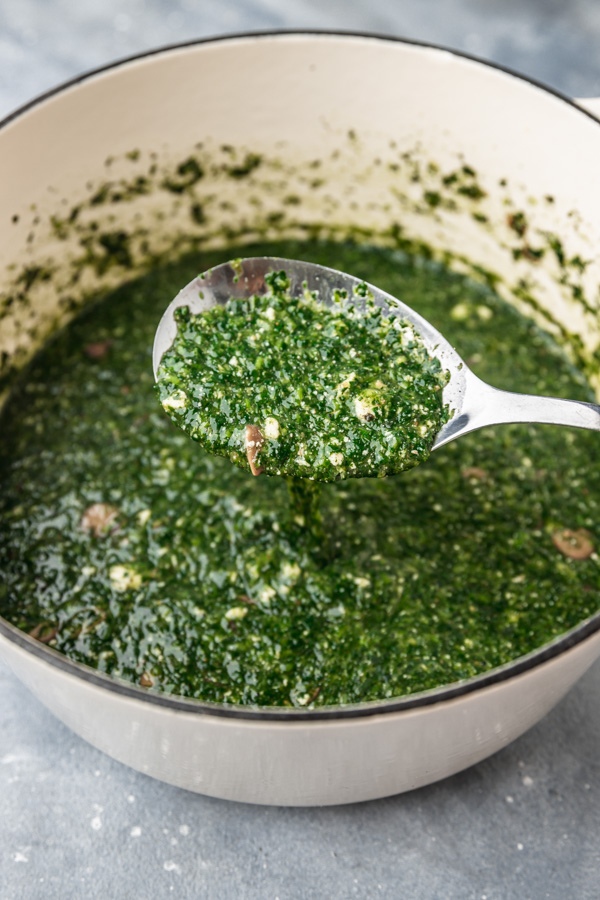
Storing instructions
In the fridge: ewedu would last for up to 3 days in the fridge if stored at the right temperature. Make sure it cools completely and store it in an airtight container. I prefer to store it at the back of the fridge.
Freezer: let it cool and transfer into a Ziploc bag or an airtight container and store in the freezer for up to 3 days
To reheat: simply warm in the microwave for about 30 seconds to 1 minute depending on the quantity. Frozen cooked ewedu can be warmed in the microwave from frozen. Alternatively leave to thaw in the fridge overnight and warm in the microwave as at when needed.
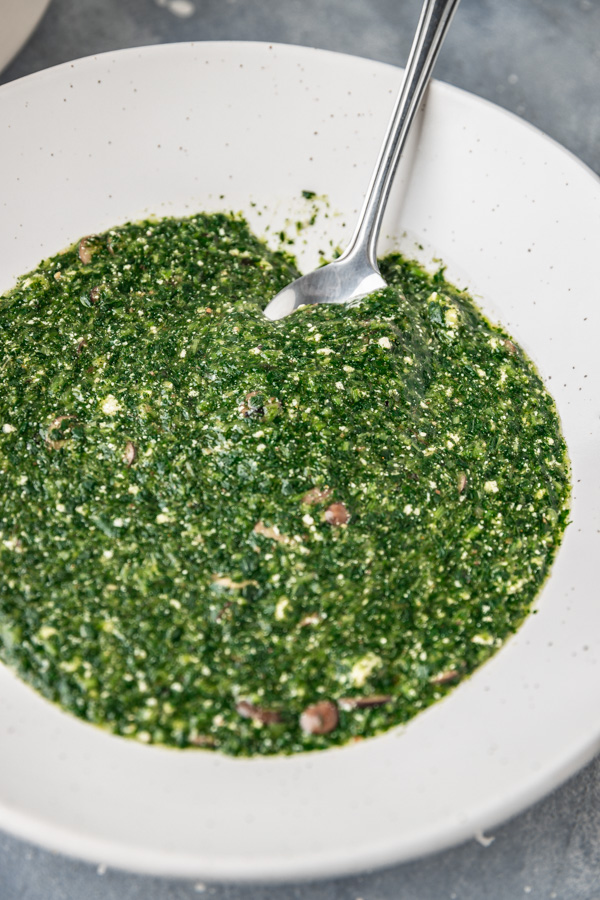
FAQS
Where can I buy jute leaves? Ewedu can be found in many Nigerian markets. If you are in the diaspora, then you should check your local African or Asian stores. Depending on where you live, the fresh leaves might not be readily available but most would stock frozen ones usually labeled molokhia.
Can I make this ahead
Yes, you can. Cooked ewedu can be stored in the fridge for up to 3 days.
More Nigerian soup recipes
Ogbono soup (obe apon)
If you made this recipe, don’t forget to leave me feedback. Tag me @myactivekitchen on Instagram and save away to your Pinterest
Ewedu Soup
Ingredients
- 400 g frozen ewedu the one I am using is already blended but they sometimes comes unblended
- ½ tbsp ground crayfish
- 2 tbsp egusi ground melon seed this is optional
- 2 tbsp Iru locust beans
- ½ tsp salt
- 1 tsp bouillon powder
Instructions
Prep
- rinse the locust beans, that is if you are using iru woro.
- Mix 1 tablespoon of water to the ground melon to a form a paste. Then set aside
How to cook fresh ewedu soup
- Fresh jute leaves: Pluck the jute leaves from the stem if using fresh leaves. Rinse and make sure it is sand free and transfer to a blender. Add little water to aid blending and blend until coarse or puree if that is the texture you prefer. (Tip add about 1 cup of water to blend 4 to 5 cups of tightly packed ewedu, too much water would hinder the vegetable from drawing)
- Transfer the blended vegetable to a saucepan and place on low medium heat. Add melon paste in bits, iru and cook for about 2 minutes. stir the soup and break the lumps of melon into the soup with the back of the spoon. Add ground crayfish, salt and bouillon powder and stir to combine.
- Continue to cook for another 3 minutes, taste and adjust seasoning accordingly.
How to cook frozen ewedu soup
- Defrost the frozen molokhia: you can use the defrost function of your microwave to achieve this or soak the frozen vegetable while still in the bag in warm water. Another way to defrost frozen jute leaves if by leaving it in the fridge overnight.
- Cook: Place a pan on low-medium heat, add ¾ cup of water and bring to a gentle boil for about a minute (this is assuming you will be cooking 400g of frozen jute leaves) then add melon paste to the boiling water in bits followed by the washed locust beans.
- Do not stir as you want the melon to solidify a bit. cook on medium heat for 2 minutes or so the stir to combine, break the lumps of egusi with the back of the spoon.
- Pour the thawed ewedu to the pot and stir to combine. Add ground crayfish, salt and bouillon powder, stir and bring to a gentle boil for another 3 minutes. taste and adjust the seasoning to suit your preference.
- Take if off the heat immediately and serve with your Nigerian soup of choice.

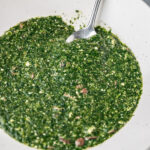
Hello Ajoke, i hope my message finds you well ?
I accidentally found your platform today and i was just laughing!
I have tried cooking Ewedu but most of the times it just doesn't draw and ogbono that one is a different palava. I just can't cook ogbono at all!.
What's more Fufu is a no go area for me. I suspect you're already dying with laughter.
Anyway, you've got a lovely set-up here and i wish you more grace.
Thank you.